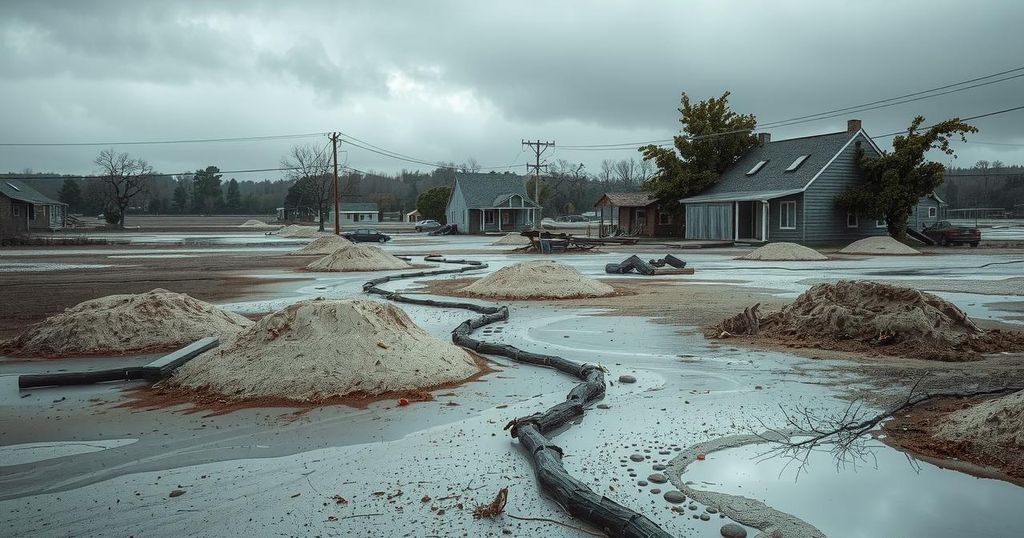Deadly Flood: Niger Communities Battle Stench From Decaying Corpses

Nearly two weeks after devastating floods in Mokwa Local Government Area of Niger State, the community is struggling with the stench from decaying flood victims under debris. Local officials and residents have voiced serious health concerns, leading to urgent requests for government action. Recovery efforts are underway, with both state and federal governments promising financial support and aid. However, the lingering odor and recovery of bodies remain critical issues that need addressing.
In the aftermath of catastrophic flooding in Niger State, communities are grappling with the nauseating stench of decaying corpses believed to be flood victims. Nearly two weeks have passed since severe floods struck the Mokwa Local Government Area, leaving behind a grim reminder of the tragedy. Residents have reported health concerns linked to the rising odor, indicating that bodies may still be buried beneath the sand and debris.
The calamity unfolded on May 28 and 29, where estimates suggest around 200 individuals drowned due to the sudden surge of water following heavy rains. The Niger State Emergency Management Agency reported that over 50 homes were swept away, displacing around 3,000 residents. There are confirmed casualties, with 161 corpses recovered thus far. Unfortunately, some bodies remain unrecovered, hidden under piles of earth and ruins, and many locals fear the health impacts of the lingering odor.
During an interview with The PUNCH, Esther Nwanosike, a local food vendor, expressed her grave concerns about the smell, saying, “I sell food in a makeshift shop. The smell is overwhelming, and I am concerned about the potential health implications.” She recounted how customers have mentioned difficulty breathing as the stench grows stronger. “The government needs to take action on this issue before we all fall ill,” Nwanosike urged, advocating for fumigation in the area.
Another resident, Alhassan Kolo, painted a stark picture of the situation. He stated that many recovered bodies are nearly unrecognizable. “Honestly, some of the bodies we recovered, you can’t even recognize them anymore because they are decaying. The water has receded, but we are battling with sand pile-up and the stench,” Kolo added. He emphasized that as they continue their search, they regularly encounter more bodies and belongings.
Similarly, Ahmed Yusuf shared the despair in the community, asserting that the remains of victims still unaccounted for are likely contributing to the unbearable smell. “I pray the government acts quickly to stop this. The stench is choking us,” he stated. Residents have raised alarms over the potential for an escalating health crisis unless immediate steps are taken.
Salihu Ishaq elaborated on the devastation, lamenting that many displaced persons do not wish to stay in government-established camps. The flood has caused unprecedented havoc, sweeping away his sister and her children. “Since I was born, I have never seen this kind of flood,” he remarked, indicating a collective sense of disbelief at the scale of the disaster.
In response to the crisis, the Federal Government, through Vice President Kashim Shettima, pledged a donation of N2 billion for rehabilitation efforts, alongside food provisions. The Niger State government has also contributed N1 billion for victim aid. Amina Abubakar, another local impacted by the flood, pleaded for swift governmental intervention, highlighting the plight of families still searching for loved ones.
Idris Ibrahim, Director of Public Health in the Ministry of Secondary and Tertiary Health, assured the public that efforts are underway to address the unpleasant odor. He acknowledged that a control team is actively working to resolve the situation. Additionally, he mentioned that the state government is considering plans to address housing needs for affected residents.
While addressing concerns over the persistent stench, NEMA spokesperson Manzo Ezekiel noted that the smell cannot be solely attributed to decomposing bodies. Floodwaters have also displaced sanitary systems, contributing to the widespread discomfort in the area. “This is a residential area with many household toilets. Therefore, the smell is not necessarily from bodies alone, it also comes from human wastes washed out,” he explained.
Niger State Governor Mohammed Bago speculated that the flooding was exacerbated by waters originating outside the country, even possibly from Niger Republic. He described the unusual levels of water in their dams, sparking fears of more flooding in the future. During a condolence visit, Bago expressed gratitude for support from other states, particularly a generous N300 million donation from Borno Governor Babagana Zulum, aimed at aiding flood victims. Zulum urged national policymakers to urgently address climate change to prevent future disasters.
The floods in Mokwa have left communities not only mourning their losses but also grappling with health concerns due to the stench of decaying bodies. As recovery efforts unfold, the federal and state governments have pledged substantial support, signaling a critical response to this disaster. However, ongoing fears about sanitation and the long-term rebuilding of the affected areas remain a pressing challenge. With the crucial actions needed to address the immediate health risks, residents hope swift government intervention will alleviate their burden and hope for recovery.
Original Source: punchng.com






